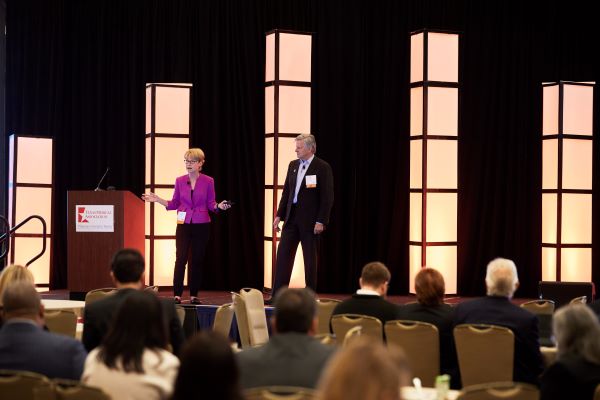
As practice consolidation accelerates, health care demand increases, and physician supply falls, medicine is in an economic shift. But by undertaking a shift of their own, one toward introspection, physicians can persist through such hurdles and improve patient care.
This was the suggestion made to Leadership Summit attendees at the opening session on Friday, Jan. 26, “Making Shift Happen: Rediscovering the Joy of Medicine.” Presenters Scott Conard, MD, and Suzan Oran, co-authors of The Art of Medical Leadership, said trading ego for authenticity can build a stronger medical team and reduce burnout – but first, physicians must identify their own motivations.
Dr. Conard, a family physician, physician executive, and co-founder and chief medical and strategy officer of Converging Health in Dallas, experienced the benefits of such a shift himself. After fielding consolidation offers in the interest of covering costs, he reached the conclusion that “the system is rigged,” contributing to what he called his dark times – a period of misery.
“I had six medical assistants that year. You can imagine how pleasant of a person I was to be around,” Dr. Conard joked. “Fast forward two or three years later, I was in the same office with the same people, and I was enjoying my work. That shift is what we’re talking about. It’s real, it happens, but it’s got to be something you orchestrate in your life.”
Given the increasing pressures on physicians, that shift is necessary, the presenters cautioned.
As Texas Medical Association president Rick Snyder, MD, a Dallas cardiologist, cited in his remarks to open the summit, the cost of health care in the U.S. is expected to increase by 50% in less than eight years, to $6.8 trillion in 2030.
“This is not an insufficiency issue, this is a sustainability issue,” Dr. Snyder said. In addition, as the over-65 U.S. demographic grows, “our physician supply is about to crater.”
Dr. Conard and Ms. Oran’s primary suggestion, which they said will ripple into team leadership and patient satisfaction, is to identify one’s own personal values, expressed through what one wishes to be, do, and have. Choosing to act aligned with those values rather than responding with instinctual choices will minimize frustration and build empathy with patients and other members of the medical team, they said.
“Times have changed, and we have got to be able to change effectively,” Dr. Conard said. “Whether it's financial challenges, clinical challenges, logistical challenges, time challenges, all the things that we face all day long, in the moment, when you start to feel that sympathetic drive go up … in that moment, you literally shift your focus and ask yourself, ‘What’s important to me? Why am I here? Why am I doing what I’m doing?’”
This shift not only gives physicians guideposts for plans of action, but also brings down the physiological responses that cloud good judgment, Dr. Conard says.
The presenters suggested ego is responsible for the doubt and skepticism that foster burnout; in contrast, recentering on one’s values renews purpose and drive.
“Even though it feels ‘soft,’ it is truly that unlocking move that will allow you to have power,” Dr. Conard said.
Practicing the skill of identifying one’s own core values allows physicians to identify patients’ values as well, which the speakers suggested will lead to better compliance with treatment and stronger rapport. Viewing patients through the same expressions of what they want to be, do, and have, paves a path to exploring the nonmedical health factors that may impede them, Dr. Conard said.
He and Ms. Oran referenced the example of a diabetic patient who deviates from diet-based blood sugar management. Rather than react in judgment, leading to frustration on all sides, an introspective shift would have a physician examine what obstacles keep a patient from being, doing, and having what they value.
“If [they] don’t feel judged by [you], your patients are more likely to open up to you and really tell you what’s going on,” Ms. Oran said.
Similarly, using that context can improve staff issues. Dr. Conard said the intentional shift away from egoism reduced the medical assistant turnover rate in his and Ms. Conard’s organization from 70% to 30%.
The highly personalized approach to navigating work and relationships additionally means physicians can continue adapting, regardless of what the future holds.
“You could actually shift today. You could shift in this hour, this moment. You might shift again tomorrow, next month – at any point,” Ms. Oran said. “That's the good news.”
For the latest on TMA meetings and events, including the upcoming TexMed conference in May, check out TMA’s Events webpage.